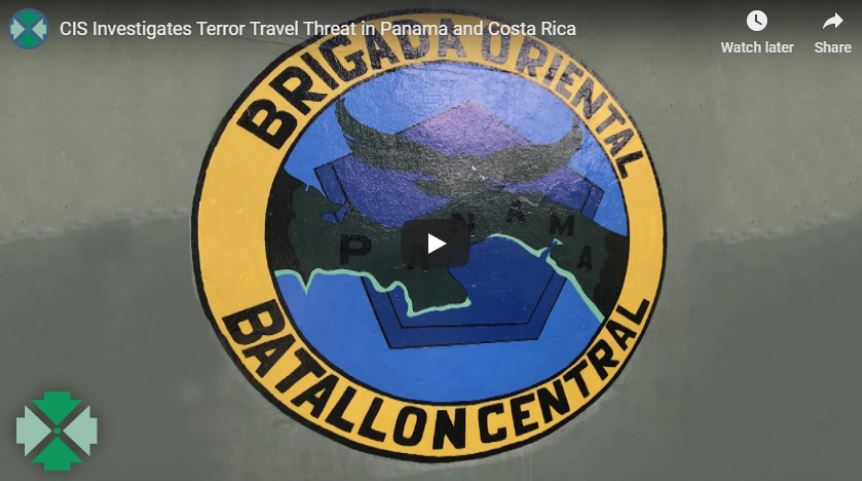As published August 28, 2024 by the Center for Immigration Studies

PANAMA CITY, Panama — In April 2022, the American public finally heard the sound of national security alarms about the U.S. southern border, when U.S. Customs and Border Protection began publishing, on a monthly basis, the numbers of FBI watch-listed terrorists caught illegally crossing (a record-breaking 378 from FY2021 through July 2024).
But what most Americans do not know is that many more terrorism suspects en route to the U.S. border could be added to that alarming number, except these ones were caught in Panama coming out of the notorious Darien Gap jungle, pulled off the migrant trails, and never accounted for in CBP’s public data reports. New official information about these additional terrorism suspects interrupted on their way to the American border comes by way of an exclusive Center for Immigration Studies interview with the chief of Panama’s National Border Service (SENAFRONT), Director General Jorge Gobea, at agency headquarters just off the Panama Canal.
Asked to comment about SENAFRONT’s reported August arrest of three Afghan terror suspects whose biometrics were taken and checked at a Darien Province immigrant reception station (described in the SENAFRONT tweet below), Gobea responded that the report was “not fake. We did take and profile a few members of a terrorist cell from … Afghanistan,” he said. “We linked and we profiled them to be members of an active cell. They were members of a Salafist group, and they had links with different activities.”
But then Gobea added that this was far from a one-off. “We have many stories of that. We don’t just have one. We have many stories of that, from Somalia, from Yemen … from Syria, from Africa.”
Gobea would not put a number on the “many stories”.
But for all those good-news stories of short-circuited U.S. border-crossings by known terrorist suspects, he also suggested that the record-breaking flood hundreds of thousands of migrants a year from 150-plus nations that began pouring through the Darien Gap from Colombia in 2021 has severely hampered the very counterterrorism screening programs that catch them and get them off the trails early.
”3 Percent in This Moment” — The Broken Counterterrorism Dam. I knew exactly what Gobea was talking about. Following a previous trip to Panama in 2018, I produced reporting about those counterterrorism programs. This was several years before the historic mass migration event that the Biden-Harris administration would unleash starting in 2021. (See 2019 video below.)
Since 2011, SENAFRONT has worked closely with in-country FBI and DHS agents on counterterrorism programs that use U.S.-provided equipment to collect migrant biometrics like fingerprints and photos and run them through terrorism databases looking for positive hits before the foreign nationals move on north.
But SENAFRONT’s director general indicated that so many began coming through the gap during the historic mass migration to the U.S. border that Central American authorities are scarcely able to screen even a fraction of them.
“Maybe at this moment … we can check like 3 percent and, in the worst moment, 1 percent,” Gobea told me. “We don’t have the capability to screen everybody.”
So many are coming that agents on the ground are left to “profile” immigrants for priority collection and checks, probably meaning if they are young men from Muslim-majority nations. But eyeballing always eludes perfection.
”Throughout the Years, We Were Catching a Lot … Hundreds.” This profound reduction in coverage to 1 percent or 3 percent in Panama stands in contrast with a 90-percent rate of screening immigrants in the country when the program started in 2011, when flows were usually well under 10,000 per year.
This is according to Edward Dolan, a former Homeland Security Investigations agent who worked deeply with these programs while later serving as DHS’s Regional Attache for Central America in the U.S. embassy in Panama City. Dolan retired from service in 2019 but still lives and works in Panama, where I met with him in a coffee shop.
“Throughout the years, we were catching a lot” of watch-listed terrorists, Dolan told me. “From like 2015 to 2019, it was hundreds.”
But checking the 550,000 immigrants that crossed in just 2023 and almost 250,000 so far in 2024?
“That’s insurmountable,” Dolan said. “I can’t imagine trying to manage what they have now.”
Dolan said those low screening rates in Panama help explain the record-high number of terror suspects getting caught and counted illegally crossing the U.S. border.
“All you have to do is look at what’s being reported at the southwest border and then go back and look at the numbers in 2019 [zero] and 2020 [three],” Dolan said. “That tells the story itself.”
Delayed Counterterrorism Responses from Colombia to Texas. So many are coming in through the Darien Gap, Gabea confirmed, that “active terrorist” migrants are sometimes mistakenly freed to proceed to countries north before biometric information submitted in Panama produces a positive hit.
A red flag goes out then, of course, and with a little luck, “they take them from the migrant flow”, Gobea explained, for interviews with American and local agents, the eventual deportation to “their official port of entry. Maybe it’s in Africa. Maybe it’s Bosnia. We return them to their previous position.”
Clearly, however, many are too long gone and don’t get caught until they hit the American border, if ever. On August 5, the U.S. House Judiciary Committee issued an interim report revealing that since January 2021, CPB released into the United States “at least” 99 border-crossing immigrants who were on the FBI’s terrorist watchlist database.
The entire multinational counterterrorism net now stands reduced in capability, and the bad guys know it, Dolan said.
“If you’re a terrorist,” he said. “this is how you’re going to come to the United States.”

